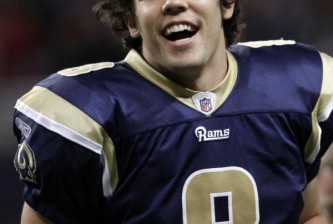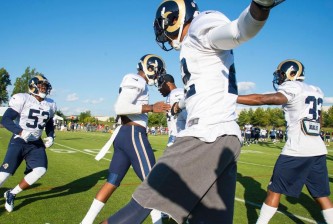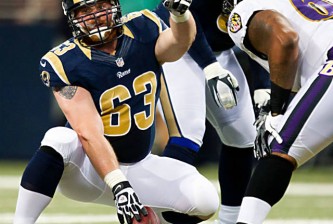
Would keeping a “loser” actually help change the “losing culture” at Rams Park?
There’s no doubting that the St Louis Rams have taken a disastrous step backwards in Coach Spagnuolo’s third year. How can we possibly build an argument to keep him? Bear with me while I explore some thoughts.
Wednesday, on his radio show, Bernie Miklasz outlined some very pragmatic reasons why Stan Kroenke might stick with Spagnuolo, including:
- There’s still a year left on his contract.
- Replacing the GM might be the first move instead.
- You may not be able to bring in anyone better next year.
None of these are very satisfying, but they’re all logical. But if Kroenke felt, as many angry Rams fans do, that there’s just no chance of winning under Spagnuolo, then all of that logic gets blown out the window.
Reasons to say “Just fire the guy and move on.”
To my mind the biggest reason to punt on Spagnuolo has nothing to do with his roster decisions or his record to date. The roster he has is playing hard, and with more talent or better luck with injuries, the record would be better by a certain measure. Neither of those are in his control.
“But wait!” you say. “He has final authority on the 53 man roster!” True, but talent acquisition is a slow process in the NFL, where you have three times as many competitors as in the fantasy football leagues we’re used to gaming. The Rams have more talent on their team now than they did three years ago, but not enough to compete with the Saints or Packers or even the Raiders in raw accumulation of skills.
The process is made slower by the fact that they have been drafting (John Greco, etc.) and signing (Ben Leber, etc.) system players that end up being poor fits for the system. Part of that failure is on the signing, and part is on the player. But those mistakes are made all over the NFL, not just here. (See: Haynesworth, Albert.)
Those mistakes are balanced by low-cost finds in Danny Amendola, Brandon Gibson, Darian Stewart and Josh Gordy that have blossomed in this system. Would I like to see them acquire more high-end talent? Yes. That was the approach in this year’s draft, which was much heavier on athletes (Quinn, Kendricks, Salas, Jabara) than in years past. That change is already underway. It has just been slow to pay off.
No, the biggest reason to doubt Spagnuolo, the biggest reason to believe that the Rams will never be able to win with him, is his appalling lack of gameday feel.
Up until recently, I was convinced that this was not a “learnable” quantity, that some men are simply born with an ability to juggle the infinite number of on-field variables in their minds, and make snap decisions based on some ineffable instinct that are, more often than not, the exact right decision. Those that have it go on to become great coaches and win Super Bowls. Those that don’t, don’t, unless they are lucky enough to have been tutored by one of the great ones.
By this thinking, every gameday gaffe by Spagnuolo – blowing a fourth and 2 decision against Washington in his first year, shifting into “prevent offense” whenever he gets a second-half lead, waffling on the goal line with the clock ticking down, or throwing a challenge flag without consulting his own replay man – was a testament to his failure as a coach. Each mistake was magnified into a mortal sin, a sign that he was morally or genetically unfit to lead this team or any team.
By this thinking, you could give Spags the keys to the ’85 Bears or the ’92 Cowboys and he would drive them into the ground. Every time.
Reasons to have faith.
But that just doesn’t make sense. For every Don Shula that won right out of the gate, there’s a Bill Walsh or a Dick Vermeil that struggled for years before the light came on. (In Vermeil’s case, it happened twice.) These men are considered coaching geniuses and great leaders of men, but it turns out that most of them had to “learn how to win” along the way.
I was reminded of this in my conversation with Aaron Nagler earlier this week, who volunteered the early resume of Mike McCarthy, coaching genius, as a comparable for Spagnuolo’s tactical troubles.
And if you take a clear-eyed look back, Spagnuolo actually has been learning. He has a much smarter and quicker approach to fourth down plays now than in his rookie year, for example. He has given McDaniels rein to call a more aggressive game in the second half, in those rare occasions when he have a lead. McDaniels’ calls worked against New Orleans, didn’t work so well (even though we won) against Cleveland, and failed completely against Arizona. That’s on McD, not on Spags.
By proxy, it shouldn’t be that much harder for him to learn to listen to players more on the sidelines — a charge leveled in a telling interview with Mike Karney with Brendan Wiese of KFNS. Or to get a quicker man in the replay booth. Or to swallow his fear and just go for it when in the red zone.
Great leadership, that’s harder to learn in my opinion, and harder to replace. Spagnuolo has that, and that differentiates him from bums of the past (Scott Linehan, etc.). That leadership is what drives the constantly-running motor of this team, why his players have not quit, why Bradford has to be sedated to keep him out of harm’s way. That leadership was completely absent in the run-down years before he arrived.
Ironically, to change the losing culture of the Rams, we might have to stick with a “loser” who has already led a massive culture change within Rams Park.
—
Note: This was originally written and expanded on as a part of a Round Table on Spagnuolo hosted by Brandon Birkhead at TurfShowTimes. Click through for the full gamut of opinion on Spags, including Brennan and Derek from this site.






















